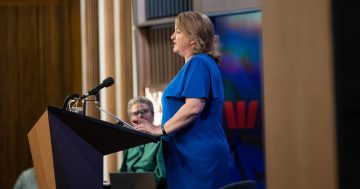
Clerical workers in all sectors could soon have legally presumed rights to work from home. Photo: Pikpick.
Clerical workers across the private sector might soon be granted a presumed right to work from home, under changes being considered to their current award.
Australian Public Service employees already have such rights.
The Fair Work Commission (FWC) is reviewing the Clerks – Private Sector Award 2020 and paying particular attention to flexible working arrangements.
It is considering whether a “working from home” term be added to the award and existing impediments removed.
Unions are on board with the idea, but employer and business groups not so much.
Treasurer Jim Chalmers, however, is a fan of WFH and believes it should be further embraced.
Speaking to the National Press Club this week, Dr Chalmers said lifting productivity was about empowering workers.
“Making the most of our human capital. Teaching and training them to adapt and adopt technology,” he said.
“Unlocking innovation, investment and dynamism to lift the potential of our people and their economy.”
When asked specifically about working from home rights, the Treasurer said he was in favour.
“It is important to provide the kind of flexibility which is key to a modern economy,” he said, but signalled a desire for flexibility and consensus-building.
“Obviously, it needs to be within reason. It needs to work for employees and employers and the best place for that to be worked out is at the workplace level.
“This is a good example, I think, of where the union movement and employers can work together to make sure we are creating and nourishing the kind of labour market which is so important to a dynamic, modern economy like ours.”
But that’s where the contention exists – between workers and employers.
While there is general consensus awards should be varied to deal with WFH arrangements to some degree, parties don’t agree on how.
The FWC has initiated a review process and called for submissions.
It has also engaged Swinburne University of Technology to draft and conduct an employer and employee survey on the issue.
That development has sparked further disagreement, with employer groups raising concerns over the potential for skewed views of workers wanting greater flexibility.
The Australian Chamber of Commerce and Industry pushed for some questions to be redrafted.
“As an overarching matter, ACCI questions the thematic desire to seek subjective analysis from employees,” it said in correspondence to the FWC.
“This will be of little utility, WFH is not a workplace right and should not be confused with one.
“What the surveys should be seeking to extract from respondents is information as to whether or not WFH is appropriately facilitated under the Clerks Award provisions where an employer and employee agree to such an arrangement.
“Among other factors, the questions also seem to be cognisant of requests for flexible working arrangement-related attributes, which should not be imported into this discussion – that is a workplace right afforded to certain categories of employee.
“Those attributes are not determinative in considering how the Clerks Award is functioning in relation to WFH.”
Australian Industry Group is pushing for WFH to be an agreement between workers and their bosses rather than a presumed employee right, and for penalty rates to be removed from such employees.
The Australian Services Union, however, is leading the charge for change and says a WFH presumption for clerks should be entrenched in law, with refusals only allowed on provable business grounds.
Those grounds would have to be centred on matters such as safety, security and cost.
The ASU has reportedly told the FWC through its private submission the award should be changed to require employers to be genuine in trying to accommodate WFH requests.
Region has contacted the ASU for comment.
In launching the review of the Clerks Award, FWC president Justice Adam Hatcher said the Commission’s proceedings were concerned with the development of a WFH term in that award because it is the “most commonly-used award under which working from home is most likely to occur”.
“The term is intended to be one which facilitates employers and employees making workable arrangements for working at home and removes any existing award impediments to such arrangements,” he said.
“The term that is developed may serve as a model for incorporation in other modern awards, with or without adaptation.”
In service-wide bargaining for the Australian Public Service, the Community and Public Sector Union secured strong flexible work rights for all APS employees.
There are now no caps on the number of days an APS employee can apply to work from home, and there is a bias towards approvals.
Original Article published by Chris Johnson on Region Canberra.











